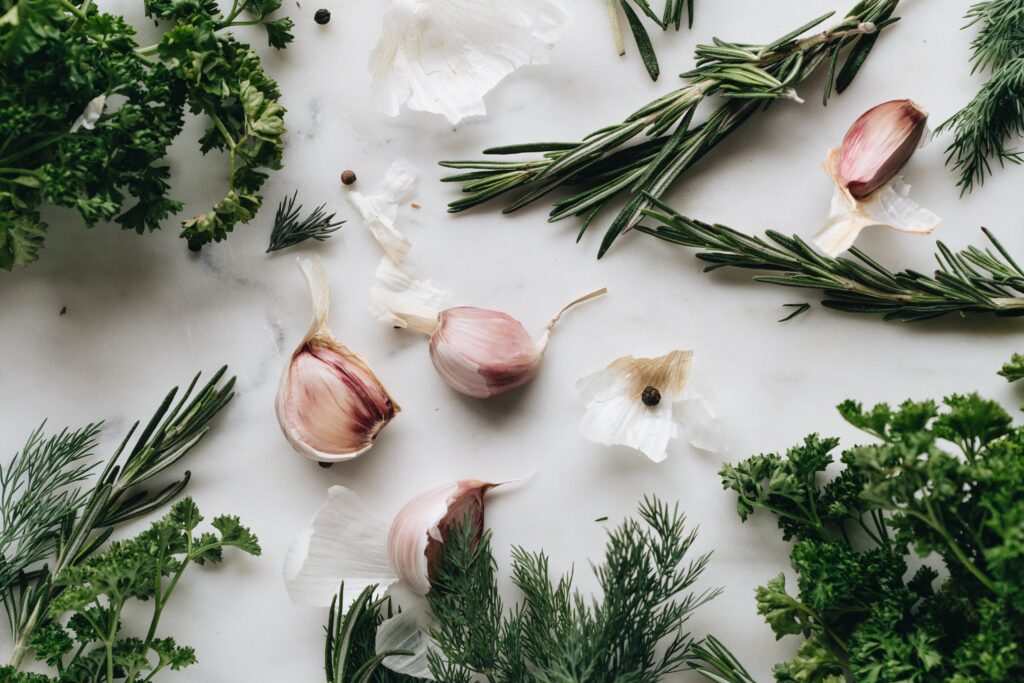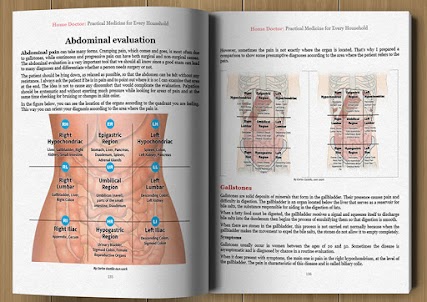It’s normal for your blood pressure to fluctuate within the day, especially if you’re doing strenuous activities like working out. However, if it is consistently high even if you’re not doing much physical activities, it can cause your heart to work extra hard and damage the arteries which can cause problems like heart disease and stroke, the two leading causes of death in the U.S.
High blood pressure, also known as hypertension, usually has no symptoms, but you can get your blood pressure measured in order to check. It is very common with almost half of the adult population in the United States having it. Thankfully, this can be managed by medication and a few dietary and lifestyle changes.
Herbs and Spices That Help Lower Blood Pressure

Although the herbs and spices listed below are backed by science, they are not meant to be treated as a miracle cure for hypertension. Instead, incorporate them into your diet on a long term basis.
Note: Some of the links here are affiliate links. There’s NO additional cost for you, but it does help our team to earn some coffee money to help write more health tips for you.
Garlic
Garlic has many beneficial properties especially concerning cardiovascular health. In fact, aged garlic extract has been found to be as effective as anti-hypertensive medications. It reduces stiffness in the arteries and cholesterol levels as well as thins the blood. It also has prebiotic properties which have been linked to potentially lowering blood pressure.
Basil
Basil is a popular medicinal herb that has been long used in traditional Chinese medicine to treat cardiovascular diseases. It has properties that prevent blood clots and is high in eugenol, a compound that helps regulate blood pressure by relaxing constricted arteries.
Parsley
Parsley helps prevent cardiovascular diseases in a number of ways. It contains carotenoids which prevent abnormalities forming in artery walls, lowers blood pressure, and improves insulin sensitivity. It lowers blood pressure by opening blood vessels which in turn helps blood flow.
Thyme
Thyme has been used in folk medicine for various diseases including hypertension, and studies have backed up its effectiveness in lowering blood pressure. It also significantly increases good cholesterol while decreasing bad cholesterol which can build up in your arteries. Its main compound, rosmarinic acid, lowers blood pressure by preventing blood vessels from narrowing.
Ginger
Ginger has shown to be effective in lowering blood pressure by opening blood vessels to allow better blood flow. It does this by blocking calcium from entering the heart and arteries which can cause contractions.
Lifestyle Changes

Managing high blood pressure can be done in two ways: medication and lifestyle changes. Some can do it with lifestyle changes alone. However, the two go hand in hand as your medication won’t work well if you don’t make lifestyle changes. In fact, preventive cardiologist Luke Laffin, MD quotes “blood pressure management is often 70% lifestyle and 30% medications.”
Exercise
Studies show that physical activity reduces the risk of hypertension. It helps train the heart to be more efficient at pumping blood. For adults, the American Heart Association recommends getting at least 150 minutes of moderate aerobic activity or 75 minutes of vigorous aerobic activity per week as well as incorporating muscle-strengthening activity at least 2 days per week.
If you are just starting, don’t worry about hitting all the numbers right away. The important thing is to start moving and eventually work your way up to the recommended level of physical activity. A general goal is at least 30 minutes of moderate physical activity every day but you can break that up into shorter bouts of activity throughout the day.
Lessen Salt Intake
Studies show that consuming too much sodium causes an increase in blood pressure and has been linked to hypertension and cardiovascular complications. The American Heart Association recommends no more than 2,300 mg (1 teaspoon) a day, though 1,500 mg or less would be more ideal.
You can cut back on sodium by avoiding processed food, food high in sodium content like cheese, seafood, and olives, and switching out table salt for other herbs and spices when seasoning your food. When eating out, familiarize yourself with low-sodium food and look for them on the menu. You can also ask for your dish to be prepared without salt.
Eat a Healthy Diet
The Dietary Approaches to Stop Hypertension (DASH) diet has been found to decrease systolic blood pressure by 6 to 11 mm Hg. The diet promotes fruits, vegetables, lean meat, and low-fat dairy products, emphasizing on fresh food over processed food and cutting back on salt.
Lose Extra Weight

Being overweight (having a body mass index (BMI) of 25 or more) causes extra strain on your heart, but losing even a few pounds can already be beneficial and help manage or prevent hypertension. It is also important to keep an eye on your waistline. Visceral fat, the extra fat around your waist, puts you at higher risk for hypertension, heart disease, and type 2 diabetes. Men’s waist circumference shouldn’t go over 40 inches while women’s shouldn’t go over 35 inches.
Behavioral changes like doing aerobic exercise and adopting the Dietary Approaches to Stop Hypertension (DASH) diet helps in losing weight and reducing the risks of high blood pressure even for people with resistant hypertension, which is uncontrolled high blood pressure despite the use of three or more medications.
Manage Stress
Chronic stress can lead to hypertension and increase the risk for cardiovascular diseases. Stress can trigger your body’s fight or flight response which can temporarily spike up your heart rate, blood pressure, and breathing. It can also lead to unhealthy coping mechanisms such as binge-eating, smoking, or alcohol consumption. Some general ways to manage stress are regular exercise, making time for loved ones, practicing relaxation techniques like yoga and meditation, music therapy, finding a hobby, getting enough sleep, and taking time off for yourself.
Limit Alcohol

High alcohol consumption leads to a lot of health risks including hypertension. Excessive drinking causes an increase in both heart rate and blood pressure. The Dietary Guidelines for Americans, 2020-2025 recommends men to limit their intake to 2 drinks or less and women 1 drink or less.
Quit Smoking
When you smoke, carbon monoxide is transferred to your bloodstream and can cause the arteries to harden over time, which can then lead to cardiovascular diseases. Nicotine also does this by increasing blood pressure and narrowing the arteries. Developing heart disease is 25 to 30 percent higher for people exposed to tobacco smoke, including nonsmokers who are exposed to secondhand smoke.
Bottom Line
High blood pressure can lead to serious cardiovascular diseases, but it can be managed by lifestyle changes and discipline. The key is to eat less, move more, and proactively make better choices. These healthy lifestyle changes not only help with hypertension, but other diseases as well since it keeps your body in a general healthy state.
Your Must-Have Guide to Ailments, Diagnosis & Unexpectedly Effective Home Remedies
Authored by 2 real doctors and a survivalist prepper, The Home Doctor, will enable you to (1) find a common “antibiotics” plant, (2) diagnose the type of abdominal pain you have, and (3) do so much more.










